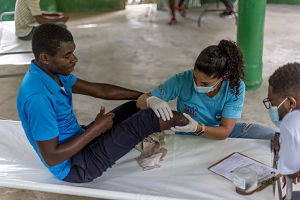Reaching remote communities
FONTEN[1], one of Humanity & Inclusion (HI)’s partners, is a Haitian organisation that manages a rehabilitation center in Les Cayes. Following the earthquake of August 2021, the organisation launched a project of mobile units supported by HI. Over a period of six months, some 60 mobile units covered the south of Haiti to reach remote communities, particularly in rural areas. The goal was to provide care to earthquake survivors and to map the remaining needs in the region, as patients from remote communities often find it difficult to travel to health structures for follow up sessions due to transport costs and poor road conditions
"In some of the more rural communities, we met with survivors who had still not seen a doctor and were still living with untreated fractures months after the earthquake," explains Consuelo  Alzamora, occupational therapist and founder of FONTEN.
Alzamora, occupational therapist and founder of FONTEN.
Through the mobile units, the organisations are able to assess the general situation and collect relevant information for the response, such as the number of people affected by the earthquake, the number of people with disabilities, and measure the overall needs of the communities. They also allowed for patients still suffering and in pain to access preliminary care. Health education sessions are consistently provided during the mobile unit rotation to support patients’ health at home.
Improving quality of life
Not all of the people met by the mobile units are in need of assistance. However, sometimes the support provided can make a real difference.
"One day we had a woman come in who hadn't been able to walk for a year because she didn't have an assistive device,” says Consuelo. “The only thing she was missing was a walker, and we provided it for her. With this walker, she will finally be able to walk again little by little. Thanks to the mobile units, we can really change the quality of a person's life and that means a lot to me.”
Support that lasts
With HI’s support of the mobile units, there are now plans to expand the project.
"This is the second time we have worked with HI, and we feel very supported,” Consuelo says. "They listen to our needs and propose solutions. The organisation helps us to strengthen our capacities, thanks to trainings and logistics support in particular. This is the best way to collaborate, as the skills we have acquired will remain in Haiti and can be used to serve the communities, even beyond the emergency response.”
[1] Fondation Tout Ensemble


 Alzamora, occupational therapist and founder of FONTEN.
Alzamora, occupational therapist and founder of FONTEN.

